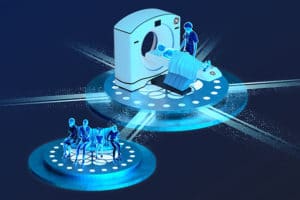Sponsored Content
The healthcare industry recognizes that a main challenge in realizing a “deep learning” and a “data driven” health-care system is the integration and execution of multiple algorithms and applications seamlessly into clinical workflows where care-teams, diagnostic physicians and health researchers do their work. A healthcare-dedicated AI ecosystem should be designed to address the four major forces affecting healthcare today: cost, quality, access, and patient & provider experience. There are solutions out there now that allow clinicians to address those forces by embedding AI into devices and applications to improve consistency, support more accurate measurements and make healthcare more precise.

Many different start-ups and AI developers use several disparate tools and methods for curating data, which then creates challenges for training and testing algorithms on these different data set. This also creates very different results that are often difficult to compare amongst algorithms. GE Healthcare has developed, and continues to refine, an ecosystem approach for curating, labeling, and training supervised and unsupervised machine learning algorithms. These development and vetting tools are intended to empower a consistent solution for developing Deep Learning AI solutions. The AI platform allows the sharing of data and/or algorithms, annotation of images, and strong cross pollination of work amongst collaborators that are in completely different locations. Finally, it’s important that such an ecosystem use open-source tools that allow start-ups and AI developers the ability to quickly get up to speed as no special training is required and also allows the ability to develop and deploy on many different platforms.
Getting started is usually the hardest part. This entails extracting and curating data as the first milestone and this is usually one of the most time consuming and challenging steps to begin developing algorithms. A virtual eco-system provides the ability to integrate and assimilate data from disparate sources, apply advanced analytics and AI to transform the data, and generate insights to support clinical, financial, and operational decision-making. A winning combination of analytics, Big Data & AI blended holistically can lead to not just one tool but an open platform: developing not just one application but an entire library. It can integrate the technology not just into one hospital or health system but into every imaging machine and health data repository. This is all designed to help achieve greater efficiency, increase access to care, and improve patient outcomes.
Another important feature to developing AI at scale that can be licensed by regulatory bodies is that the entire process including the data used can be traced throughout the development of an algorithm, which could radically simplify the healthcare community’s ability to create compliant AI applications.
A stepped approach to developing AI at scale would include the following services to support the ‘first step’ all the way to the ‘last step’, including:
- AI builder— A solution that is used to ingest, curate and train AI algorithms. This is the first mile in AI realization within healthcare.
- AI Inferencing Service—Packaging, optimization, and publishing of the AI algorithm for seamless and invisible deployment. This is the last mile in AI realization within healthcare.
While cloud and Federated learning solutions are powerful solutions to AI development, deploying AI requires less computational power and should reside at the point of care for better security and lower latency. AI implementation within healthcare needs to be seamlessly applied to existing tools and workflows that caregivers currently use to realize widespread adoption. A single vendor-neutral solution to deploy and orchestrate amongst many different algorithms across many different medical devices and across many different PACS solutions is paramount to making the last step in the AI realization journey a reality.
With the hundreds of AI start-ups that are entering a foray into Healthcare, a developer program that accelerates bringing AI to market would be welcome in Canada. While the traditional healthcare accelerators are well placed to test new technologies within healthcare, they have typically lacked the capability to cross the last milestone of deployment and global commercialization. A Developer Program that brings some of the tools mentioned above also facilities the ability to integrate AI into existing advanced applications – on medical devices, in the cloud or at the edge of the network will bode well for start-up and the AI developer community. While the ecosystem should be able to support all forms of AI deployment such as Cloud, the very best solution is to deliver AI solutions at the point of care for security and latency issues. Such a program breaks down barriers to adoption for clinicians, ultimately reducing costs and improving the value of new solutions. Building on these initial collaborations, it is essential to launch an AI Developer Program in Canada.
In the space of healthcare AI, where there are literally infinite opportunities across specialties, modalities and patient populations, a thriving network is needed to democratize the technology. Compliance with industry and regulatory architecture & standards, and collaboration with academia and industry are critical. This will increase the number of algorithms in AI-powered devices and advanced applications, and thus improving healthcare dramatically from an efficiency standpoint on a global scale.
